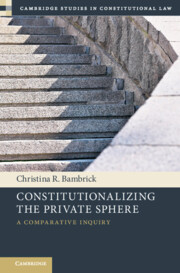Book contents
4 - India
Citizens’ Duties in Aspiring to Equality
from Equality
Published online by Cambridge University Press: 23 January 2025
Summary
The framers of the Indian Constitution laid explicit foundation for horizontal application, specifically in Articles 15, 17, 23, and 24. The constitutional debates reveal deep disagreements about the country’s future. At the same time, the textual provisions for horizontal application evince a clear vision on the part of key framers, such as B. R. Ambedkar and Jawaharlal Nehru, to combat entrenched systems of caste and discrimination. These and other framers aimed to instill a new fraternity across the polity, in part by holding private actors accountable for constitutional commitments. In the ensuing years, the Supreme Court vacillated between emphasizing the constitution’s conservative and transformative elements, often under the watchful eye of other governing institutions. For example, the Court largely yielded to Indira Gandhi’s excesses during the Emergency Era of the 1970s, and later to the Hindu-nationalist BJP’s agenda. Likewise, the Court’s development of horizontal application has been somewhat uneven, applying constitutional duties to private actors in a handful of cases. In those instances, involving such salient issues as labor, sexual assault, housing, and education, the constitutional discourses that emerge echo republican rationales from the founding era.
Keywords
Information
- Type
- Chapter
- Information
- Constitutionalizing the Private SphereA Comparative Inquiry, pp. 101 - 142Publisher: Cambridge University PressPrint publication year: 2025
